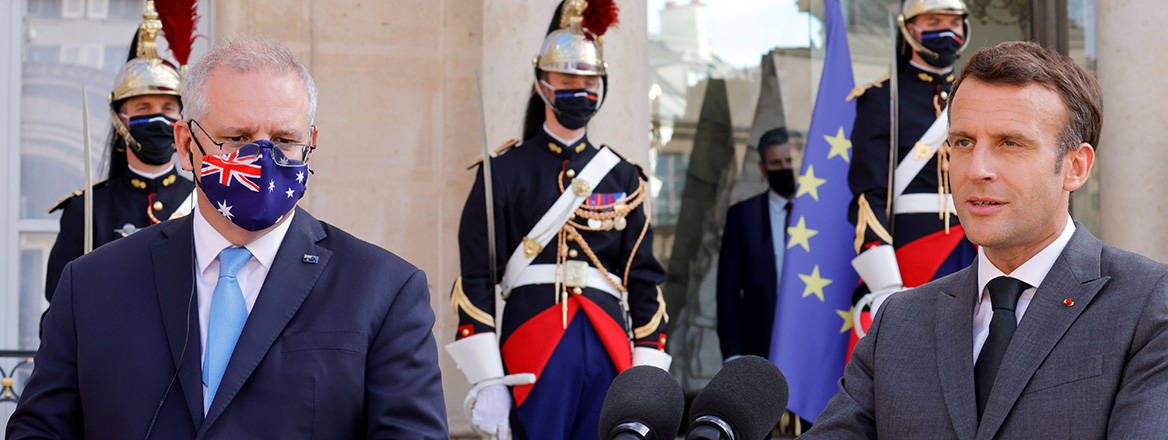Europe’s Selfish Reaction to Australia’s Submarine Purchase
Some EU member-states are furious at Australia’s decision to abandon a submarine contract with France. But Europe’s persistent inability to grasp the reality of the Chinese challenge contributed to Canberra’s decision.
Some European countries, led by France and its president, Emmanuel Macron, continue to protest vehemently against the decision of the Australian government to withdraw from a purchase agreement for French submarines and to opt instead for US nuclear-powered versions.
Yet, the intensity of these European protests cannot obscure the fact that the Australian government has made a legitimate decision. It has opted for a provider that promises a more capable product. Furthermore, neither France alone nor the EU can offer the Australians a credible guarantee of assistance in the event of a military conflict in the Indo-Pacific region of the kind the US can. The protests of European governments show that economic interests continue to carry greater weight in Europe and still enjoy priority even in an increased standoff with China.
Plenty of Problems, Plenty of Warnings
The procurement of new submarines for the Royal Australian Navy has preoccupied Australian politics for years. Back in 2016, the decision was made in favour of the French state-owned company DCNS – today’s Naval Group – and against competing offers from Germany and Japan. The project, however, was not blessed with good fortune for some time. Just a few months after signing the preliminary contract, the French company had to admit that a data leak had occurred during the construction of comparable submarines for the Indian Navy, and that significant parts of the construction plans had been stolen. In 2016, the Australian media pointed out [paywall] that a similar data leak on the Australian contract would render the submarines useless. Thus, an A$50 billion investment could have been wasted [paywall] if the submarines’ performance and construction data were known to potential military opponents.
The protests of European governments show that economic interests continue to carry greater weight in Europe and still enjoy priority even in an increased standoff with China
In addition, the costs rose from the original A$50 billion to A$90 billion within a short period. In May 2021, speculation was rife about the possibility that the Australian government might, after all, acquire German ThyssenKrupp submarines to shore up the country’s defences. In June 2021, Greg Moriarty, the Secretary of Australia’s Department of Defence and the most senior civil servant in that department, revealed that he had been thinking about alternatives to the French submarines for a year.
Plenty of Tensions
However, even more severe than the problems between the French company and the Australian government is the escalation of geopolitical tensions in the Indo-Pacific region. The Chinese government has tried harder and harder to assert its interests in recent years. Australia was not the only country to feel the impact of the new Chinese foreign policy, but it was there that the consequences were most evident. Canberra appeared to be a test balloon for how far the Chinese government could go before it met resistance. A classic case of this came in November last year when the Chinese government presented a catalogue of 14 demands that the Australian government had to adhere to if it wished to enjoy ‘normal’ relations with China. This included, for example, the demand that the Australian government rescind its insistence on an investigation into the origins of the coronavirus pandemic.
Beijing’s growing pressure on Australia has not led to a submissive attitude there. Prime Minister Scott Morrison’s government enjoys a high degree of support from Australian citizens for its tough stance on China. According to a survey by the Lowy Institute, almost two-thirds of Australians – 63% – see China more as a security risk and less as a business partner in 2021. By comparison, in 2018, a full 82% of respondents in a similar survey regarded the People’s Republic as more of an economic partner, and only 12% of the Australian public viewed China as a security risk. This dramatic change in the public perception of China marks a turning point.
And No Workable European Approaches
Europe has still not taken sufficient notice of this change in the assessment of China in Australia. It has also not paid adequate attention to the opinion of many other countries in the Indo-Pacific region. The countries bordering the Pacific have recognised that China is massively arming itself and disregarding international legal norms.
Meanwhile, Europe is primarily concerned about jobs in French arms factories and German industry. The EU does not yet have a conclusive answer to the challenge posed by China: it is oscillating between relatively mundane protests against Chinese actions it does not like and a determination not to anger the Chinese state and the Communist Party leadership.
Against this background, it is only logical that the Australian government cancelled its order for French boats and laid the foundations for a new military alliance with the US and the UK. India and Japan, already cooperating militarily with the US and Australia, could join this alliance. Beijing would then be confronted for the first time with a broad multilateral military pact that would respond appropriately to possible future Chinese aggression.
Heribert Dieter is a scholar at the German Institute for International and Security Affairs (Stiftung Wissenschaft und Politik, SWP) in Berlin. His book, Chinas neuer Langer Marsch (‘China's New Long March’) was published in June. An earlier version of this analysis appeared in the Neue Zürcher Zeitung on 29 September 2021.
The views expressed in this Commentary are the author’s, and do not represent those of RUSI or any other institution.
Have an idea for a Commentary you’d like to write for us? Send a short pitch to commentaries@rusi.org and we’ll get back to you if it fits into our research interests. Full guidelines for contributors can be found here.

